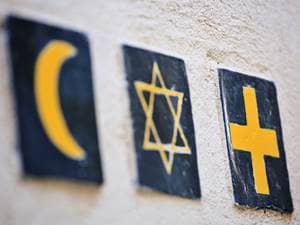
Judaism, Christianity, and Islam are the three great monotheistic religions of the world. They share the belief in one God who created all things in the beginning and will be the judge of all things in the end. Their individual canons share many of the same stories of faith and the concept of a “people of God”—as initially articulated in the Jewish scriptures, sometimes referred to by Christians as the “Old Testament.” Their common reverence for God’s call on the life of Abraham, and the resulting creation of the people of God, is why they are all called “Abrahamic” religions.
Judaism is the oldest of the three faiths, and its sacred scriptures are the origin material for the other two as well. Jews recognize Abraham as the father of their people, for he heard the call of God and left his pagan background to become the first of the Hebrew people. His story, and the development of the nation that comes from him, is embedded in the first five books of the Bible, the Torah. Scholars suggest that Abraham may have lived around 2000 B.C.
Christianity arose out of the Jewish community and its traditions, for it is based on the life and death of Jesus, who was a Jew. Those Jews who believed that Jesus was the long-awaited Jewish Messiah were gradually known as Christians. As time passed, more and more non-Jews (Gentiles) also believed this, and the Christian community separated from the Jewish community of faith. Their stories are told in the New Testament. Jesus was executed in approximately A.D. 33.
Historically speaking, Islam developed last, but traces its spiritual lineage back through Abraham as well. Abraham had two sons—Ishmael, the oldest, and Isaac, the younger. While Muslims revere Isaac as a prophet, they trace their spiritual ancestry to Ishmael. Muslims teach that the revelation of God to the Jews and to the Christians was true (as given by God or Allah), but became corrupted over time. According to Islam, the prophet Muhammad (PBUH) received divine revelations (beginning in A.D. 610) that corrected these corrupted teachings and, over time, resulted in the Qur’an, the authoritative word of God.
Jews, Muslims, and Christians share many moral and ethical values. Each religion speaks passionately about the holiness of God, the problem of sin, and the value of human life. They share many spiritual practices, such as prayer, study of sacred texts, community, gathering in worship, acts of service, almsgiving, and feasting and fasting. They all anticipate an end of days when God will judge all people, rewarding goodness and condemning evil.
The three religions differ on the nature of God. In Judaism, God is One, completely other, but has an intimate and loving relationship with God’s people; a relationship in which God is often described as a Father, a Shepherd, and even a Husband. Jews await an appointed Messiah, one who will come to make all things right and establish God’s eternal reign. In Christianity, God is One, completely other, but exists in Three Persons—Father, Son, and Holy Spirit. As a sign of God’s love, the Son entered into this world as a human being, Jesus the Messiah, and has initiated God’s reign now through his death and resurrection. Muslims revere Jesus as a prophet (or Messenger of Allah), but reject the Christian teaching that Jesus is God’s Son, and that he has already been resurrected. For them, God (Allah) is One, completely other, and sovereign (with no “partners” and no “offspring”). Islam speaks often of the All-Compassionate and All-Merciful God, but divine love is withheld from the wicked. While the idea of Messiah as expressed in Judaism and Christianity shows up in some branches of Islam, it is not generally understood in the same way among Muslims.
Nevertheless, they agree with the hope of a day when God’s rule is established throughout the world.
Learn more about these three great religions: Judaism, Christianity, and Islam.
Image credit: Shutterstock.com5/14/2024 8:41:49 PM










